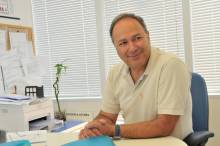
With 40 percent of Jerusalem’s population comprised of children who come from diverse ethnic backgrounds, The Hadassah Medical Center’s Pediatrics Division, chaired by Prof. Eitan Kerem, has its challenges.
But, as Prof. Kerem brings out: “It’s not a challenge for the children. Children do not understand the politics; children do not develop feelings against the other side. It’s easy with them. They can also communicate without language. They can understand each other just by expression; through hand movements.” The major challenge, he explains, is the parents. “Many times they are hostile and they don’t have trust,” he says. To deal with this situation, the hospital staff provides many activities “to help the parents see each other as human beings, despite their different backgrounds and opinions about how the Middle East conflict should be solved.”At times, Prof. Kerem receives a request from parents to change their child’s hospital room because they are afraid of the other patient’s family members, who are so different from their own. Palestinians, for example, are sometimes anxious about being in a room with a Jewish settler because, in their eyes, these settlers are terrorists.
“We always refuse,” relates Prof. Kerem, “and usually within one day, they start to build trust in each other and see one another as human beings.”
With over 350 pediatric beds in Hadassah’s two hills of healing in Ein Kerem and on Mount Scopus, a medical team of about 500 doctors, nurses, social workers, physical therapists, and nutritionists care for the young patients. On the one hand, Hadassah’s medical professionals are involved in very sophisticated surgeries, such as bone marrow transplants and cardiac catheterizations to eradicate severe pediatric heart problems; on the other, they are very much focused on the modern community’s “new epidemics,” such as obesity, attention deficit hyperactivity disorder, and learning and behavioral problems.
Because of the high degree of inbreeding among some populations of Jerusalem, Hadassah’s pediatrics department sees a lot of genetic disease, generating an emphasis on genetic research. The goal is to identify new genes in order to understand the mechanism by which disease is caused and to develop a treatment for it. One therapy employed is “gene modifier treatment,” which either targets the genetic defect itself or the mechanism that causes the gene to become defective.
“On the one hand,” says Prof. Kerem, “we are touching the future. On the other, we are trying to prevent the sicknesses of society by promoting behavioral modifications and healthy child development.”
Hadassah is proud of its pediatric collaborations with Australia, France, Denmark, Germany, Italy, and the United States. Prof. Kerem notes that Hadassah is known for its curiosity and creativity; for its ability to ask questions and provide innovative answers. In many areas, Prof. Kerem relates, Hadassah’s research has paved the road for other researchers around the world which, in turn, led to new therapies. One example relates to a form of cystic fibrosis (CF), a genetic disease, in which there is a defect in the regulation of a certain protein’s production. Ten years ago, Hadassah analyzed the ability of certain antibiotics to bypass a premature command that interfered with the production of this protein. Following Hadassah’s success at proving the merits of this concept, an American company took the strategy a step further by identifying a less toxic compound to accomplish the same goal. This compound is now being studied internationally in 34 countries to treat CF patients who have this type of genetic mutation.
Prof. Kerem was born at Hadassah, as were his three daughters and five grandchildren.
He grew up among Holocaust survivors. “I felt like I was the new generation that would build a new country for the Jewish people,” he said. Prof. Kerem’s wife, Bat Sheva, is a professor of genetics at the Hebrew University, where she runs a research laboratory. She does basic research on cystic fibrosis and collaborates with her husband, who is engaged in clinical research in CF. The Kerem’s older daughter is a child psychologist, whose specialty is rehabilitation psychology; her husband, a horse farmer, helps children through horseback riding therapy. The middle daughter is also a child psychologist and their youngest is looking into studying medicine.
Asked about the benefits of the new Sarah Wetsman Davidson Hospital Tower, Prof. Kerem noted that “it is a milestone in the history of Jerusalem, for it changes the way we can treat our patients.” He explains: “The new pediatric surgery operating rooms will enable us to perform complex heart, neurological, orthopedic, and bowel surgeries that we were not able to do before. We have the capability; we have the knowledge; we know the techniques. Now with this new facility we will be able to give the gift of life to children and their parents that we could not previously give.”
